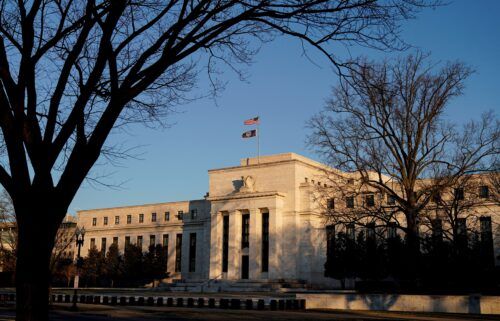Stocks are expensive but that doesn’t mean the bull run is ending

People walk past the New York Stock Exchange on Wall Street in New York.
By Paul R. La Monica, CNN Business
Stocks enjoyed a stellar first half of the year. But will the market be able to keep rallying?
Valuations are rapidly approaching historically expensive levels, and some experts are worried about how high stocks are relative to their earnings. One market measure, the Cyclically Adjusted Price-to-Earnings ratio, or CAPE, compares a stock’s price to actual reported earnings (as opposed to estimates) over a 10-year period.
Proponents of CAPE, also known as the Shiller PE since it was popularized by Nobel prize-winning Yale economist Robert Shiller, argue that this is a better gauge of the market’s overall valuation since it looks at a longer period of historical results instead of relying on forecasts for one year.
Here’s the bad news. The CAPE ratio is currently hovering around 38.
Why it matters: That’s well above levels of about 27 from late 2007 right before the global financial crisis and it’s also significantly higher than the CAPE ratio of around 33 way back in September 1929 just before the historic October market crash at the onset of the Great Depression.
The only time stocks have been pricier than now is early 2000 just before the dot-com bubble burst. CAPE peaked around 45 two decades ago.
“The current CAPE ratio is the second most expensive it’s ever been and the most expensive since the tech boom. This gives us reason to pause and think about risks,” said Eric Lynch, managing director at Scharf Investments, in a recent report.
Still, other experts point out that the CAPE ratio had been consistently rising for the past few years before plunging in March 2020 as corporate profits tanked and stocks fell into a Covid-induced bear market.
So the fact that stocks are getting more expensive again may not be that alarming when you consider that earnings have rebounded so sharply as the economy is returning to normal.
“The [CAPE] ratio is less useful after a recession or a period of deep earnings growth contraction,” said Sean Darby, global head of strategy for Jefferies, in a report.
That may be true. But there’s another market barometer that is looking frothy — and it’s one that none other than Oracle of Omaha Warren Buffett has praised in the past.
The market value to gross domestic product ratio, which looks at the market cap for all companies in the Wilshire 5000 index compared to US GDP, is currently at an all-time high of about 236%. In other words, stocks are worth more than twice as much as the entire economic output of America.
Buffett said in an interview with Fortune magazine in 2001 that this ratio is “the best single measure of where valuations stand at any given moment.”
But it’s worth pointing out that GDP has also rebounded sharply this year and is expected to post solid gains again in 2022 and 2023, said Aash Shah, senior portfolio manager with Summit Global Investments. So stocks are rising along with a booming economy.
“We’re not just recovering off the bottom,” Shah said, pointing out that corporate revenues are expected to post double-digit gains this year and in 2022 as well.
Shah told CNN Business that he thinks the current market rally can continue because stocks should rise as long as the economy continues to recover. He noted that the rapid rebound in manufacturing is a good sign, as is the fact that politicians may finally have reached a bipartisan infrastructure deal.
Shah conceded that stocks are not cheap. But he said valuations for the broader market aren’t “out of whack” with the economic reality and added that it’s encouraging to see that risky bitcoin and other cryptocurrencies as well as momentum stocks like Tesla have pulled back from their highs.
“The froth has come off in some assets. There was a speculative frenzy,” Shah said.
Power problems in China
China is in the middle of a huge power crunch as extreme weather, surging demand for energy and strict limits on coal usage deliver a triple blow to the nation’s electricity grid.
It’s a problem that could last for months, straining the country’s economic recovery and weighing on global trade, my CNN Business colleague Laura He reports from Hong Kong.
Several Chinese provinces have said they are facing a power crunch in recent weeks, including some of the country’s most important engines for economic growth.
Guangdong province — a manufacturing center responsible for $1.7 trillion, or more than 10%, of China’s annual economic output and a bigger share of its foreign trade — has been rationing power for over a month. The restrictions have forced companies across the province to shut down for a few days per week. Some local authorities are warning that power rationing could last through the end of the year.
It’s not just Guangdong. At least nine provinces have said they are dealing with similar issues, including Yunnan, Guangxi and the manufacturing hub of Zhejiang, forcing regional authorities to announce power curbs across an area of China the size of the United Kingdom, Germany, France and Japan combined.
The power crunch even contributed to a slowdown in factory activity growth in China in June, the country’s National Bureau of Statistics acknowledged on Wednesday.
The shortages could deliver a one-two punch that may knock China’s fragile recovery off course, while spelling further trouble for global supply chains that are already struggling to cope.
“The power rationing will inevitably hurt the economy,” said Yan Qin, lead carbon analyst for Refinitiv.
Up next
Monday: US markets closed
Tuesday: ISM Non-Manufacturing Index
Thursday: US unemployment claims; EIA crude oil inventories
The-CNN-Wire
™ & © 2021 Cable News Network, Inc., a WarnerMedia Company. All rights reserved.

